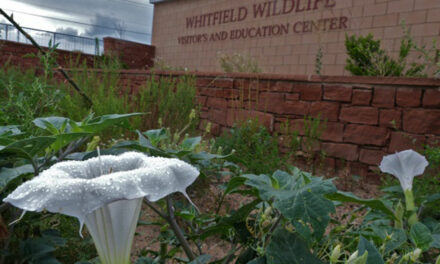After making an appearance before the Belen magistrate, a Los Chavez woman was found guilty and fined for having too many dogs on her property.
In March, Kathryn Jean Kadel was cited by a Valencia County Animal Services officer for having 20 dogs on her property, exceeding the 12 allowed under Valencia County ordinance.
During an Aug. 15 hearing before Belen Magistrate John Chavez, VCAS officer Ernest Rael said the dogs on Kadel’s property were in good health, had food, shelter and water, and were current on their vaccinations.
The issue was the number of animals on the one acre property. County ordinance requires at least 3,500 separate square feet of surface area for each dog or cat. At 43,560 square feet to an acre, that breaks down to a dozen dogs or cats.
Kadel acknowledged she had more dogs than allowed by law, but told Judge Chavez she felt the number was within her capacity to care for. When asked, Kadel said she was unwilling to reduce the number of dogs, indicating she would be willing to move to a larger property in order to keep them.
The judge found her guilty and fined Kadel $300 plus court costs. Chavez pointed out she could be cited repeatedly by animal services until she comes into compliance with the ordinance.
“They could cite you tomorrow, and the day after that and the day after that,” Chavez said. “Each time is a separate violation and possible fine.”
During an interview on Aug. 24, VCAS director Jess Weston said several members of the public had reached out to him with concerns about the number of dogs Kadel had on the property and their living conditions, which led to a full inspection of the property and eventual citation.
Weston said Kadel has obtained the use of property adjacent to her home which, when added to her property, created an area large enough for the number of dogs she currently owns.
“She’s given them the area they need,” Weston said. “When we did the inspection, we found some areas of concern, such as how things were being cleaned and organized, but we were able to get them addressed before they became a violation.”
Weston said Rael and the department would continue to monitor the situation to make sure proper conditions were maintained on the property and the number of animals didn’t exceed what’s allowed in the ordinance.
The inspection found the dogs in good health and care, with complete documentation of vet care and vaccine records.
“The dogs were not in bad shape,” the director said. “Were they in tight confinement? Yes. They were in a substantial metal building with AC and heat. They weren’t starved, they weren’t abused. It was the confinement.”
The county’s rural residential zoning ordinance stipulates the amount of space required per animal for everything from livestock to domestic animals. For example, each cow, horse or similar animal is required to have 10,000 separate square feet of pervious surface area, and poultry and rabbits need 600 square feet each.
“Animals need a certain amount of space to move, to live,” Weston said. “To defecate and use the bathroom where they’re not sleeping. It’s a health issue.”
A violation of the ordinance can result in a $300 fine and/or 90 days in jail.
In March of 2022, the Valencia County Commission approved a new animal control ordinance. While the most significant change to the ordinance banned tethering as a permanent or long-term means of confinement in the unincorporated parts of the county, Weston says it addresses far more than tethering.
“For instance, if you have an animal outside, not only does it need a dog house, it needs shade,” he said. “Yeah, you can have a little plastic igloo dog house sitting there baking in the sun but it’s not OK for the dog. It has to be able to get out of the heat.
“Same thing in the winter. It’s not sufficient in 10 degree weather. It’s not going to protect the dog. The ordinance addressed a lot of issues like that.”
Since it was enacted more than a year ago, Weston said the department has extended something of a grace period to county animal owners.
“Up until about the beginning of this year, we were really working on education, not issuing a lot of citations. Now we’re taking the gloves off and issuing the citations. The grace period is gone,” he said. “It’s time to take some ownership in the situation here. We’re holding people accountable and they don’t like it.
“You know, it’s time to care for the animal that you want to have.”
Julia M. Dendinger began working at the VCNB in 2006. She covers Valencia County government, Belen Consolidated Schools and the village of Bosque Farms. She is a member of the Society of Professional Journalists Rio Grande chapter’s board of directors.

















